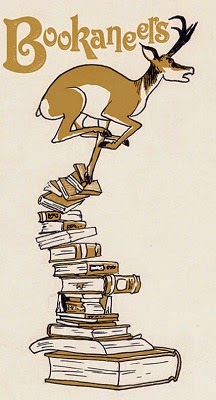
Several Bookaneers have been off adventuring this summer--which isn't quite over, but I'm (almost) back, so here I am, reporting on my own library-related experiences. Summer reading-wise I took advantage of the break to ingest some literature I'd been meaning to get around to (Cormac MCarthy? Verdict: Yes.), but not as much of the fodder for current social and political debate as some of these other posters.
I certainly had enough to think about, however; as I mentioned here before leaving, I spent a month in the picturesque hinterlands of Italy, leading a team to organize a private nonprofit library focused on architecture.* Heading out, I had my concerns, including how it would be to lead a team with little oversight (none from anyone with more library experience than myself), and the difficulty of judging the needs of a library I'd never seen, and for which we had very little information (not even a book count!).
What I found, however, was that it was a great opportunity to put into practice a lot of the principles we'd just begun touching on in last year's classes. With a tight schedule, I had to focus in quickly on what I thought we'd be able to accomplish, and get a working version of a cataloging standard visualized so that we could dive in with enough structure to ensure that we were moving towards a concrete goal. I had done quite a bit of research beforehand on different cataloging standards and organizational approaches. I know this will stand me in good stead in the future, but in the end I realized our library was small and specialized enough that it made the most sense for me to strike out and create a customized scheme myself, using only the general principles of more thorough and wide-ranging standards.
Thankfully, the three other interns I was managing turned out to be very motivated and capable, not to mention fun to work with--after only a few days, they were initiating unprompted discussions about the finer points of the library's categorization on our down time!--and the library was manageable, at a bit over 2,000 books. The time span we had to work with (four weeks, more or less), turned out to be just long enough to formulate a cataloging scheme; physically relocate the books, which were in two separate buildings (sometimes more than once...); work with the webmaster of the bibliography module we were using to fine-tune its capabilities to our needs--and those of future libraries to use the module; and enter the necessary data for each record (especially important, given the geographic dislocation between the library itself and the nonprofit headquarters, based in Seattle). One particular challenge was that we decided at least the titles of each work should be in the database in English; while much of the collection was in English, there were also significant portions in Italian, German, Latvian, and a few other languages. We had a range of linguistic abilities on the team, which came in immeasurably useful, but I know I became intimately acquainted with the useful, if at times humorous, ways of Google translate.
Of course the project evolved as it went on and now, looking back, there are things I would do a bit differently, but I'll just take this as a sign that I actually learned something. Overall I think we accomplished an impressive amount--even more than I expected--and as this was the first but not the last organizational project for NIAUSI, as well as their first attempt at using interns, we set a good precedent for the work to come. Most importantly, however, we acquitted ourselves well both in giving an accurate and useful picture of what is present in the library (including some amazing old books, and lots of personally autographed/gifted works), and in creating a structure for the library that will be useful and more intuitive for future researchers to navigate.
And Italy? That would require a blog of its own...
*The library currently has no public interface, but the organization, NIAUSI, also sponsors fellowships for travel to Italy; if you know anyone eligible for their upcoming round, encourage them to apply!
